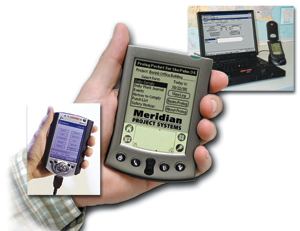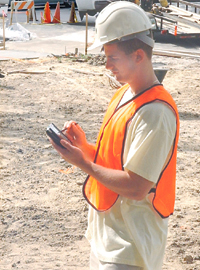As hardware vendors continue to cram more computing power into smaller packages, design and construction firms are beginning to realize tangible benefits. Once novelties, handheld devices are becoming more common at jobsites and in briefcases of industry executives on the go.
Mobile devices are making inroads in such areas as design, data collection, project management and inspection, offering new avenues to capture information digitally and communicate ideas in real time. But how far the devices can reach into industry niches might depend on how computer manufacturers address such limitations as screen displays, environmental durability and connectivity.
 |
| PLUGGED IN Caltrans employees depend on personal digital assistants to retrieve data. (Photo courtesy of Bear/River Associates) |
The California Dept. of Transportation has been an early adopter of personal digital assistants in the field, deploying about 800 in the last five years, says Yader A. Bermudez, construction support manager in San Francisco. Most of its PDAs run the ePeg construction diary system offered by Bear River Associates Inc., Oakland.
Bermudez says electronic inspection data can pay dividends when Caltrans needs to retrieve information quickly. "You can put the information in a handwritten diary in about the same time, but you get better information that you can use in the future [with a PDA]," he says. In one case, a contractor filed a $350,000 claim for added costs on the Cypress Freeway replacement project in Oakland, but then dropped it to $90,000 after Caltrans retrieved data from a pda quantifying the actual scope changes.
Anthony Meadow, Bear River president, says the company developed ePeg to automate data collection on construction projects from an owner's standpoint. "Historically, it's been hard for project managers to know the status of a project," he says. "By collecting data electronically instead of on paper, information is more accessible." The Delaware Dept. of Transportation and the U.S. Federal Highway Administration also use ePeg, Meadow says.
The mobile portion of ePeg runs on pen-based computers that support Windows CE, Microsoft's scaled-down operating system for mobile devices. Field users collect project information such as pay items, labor and equipment, and build electronic diaries that are uploaded to a central database via a serial connection. Once there, diaries can be electronically edited, stored and retrieved. ePeg costs $2,300 per user but is sold as an entire Oracle database system for an enterprise.
Other mobile project management tools are on the market. Meridian Project Systems, Folsom, Calif., last year partnered with Onsyss Mobile Computing, Greenbelt, Md., to develop Prolog Pocket, a mobile version of Meridian's Prolog Manager software. Pocket versions are available for both Palm and Windows CE devices, says Troy D. Tyler, marketing manager. "It eliminates the clipboard and allows you to access your calendar, addresses and other important information," he says. Prolog Pocket is priced at $299 for Palm devices and $395 for Windows CE.
 |
|
HANDY Devices operate on two platforms. (Photo left courtesy of XYZ works; center courtesy of Meridian Project Systems; right courtesy of Info Tech) |
Gainesville, Fla.-based Info Tech Inc. has developed two handheld applications for managing highway projects–SitePad for Palms and FieldPad for Windows CE devices. While similar, SitePad is a newer offering that fits with the company's SiteManager integrated construction management suite. FieldPad was introduced last year as part of the FieldManager suite tailored to field offices. Both applications are part of the Trns.port program sponsored by the American Association of State Highway and Transportation Officials. FieldPad costs $595 each, while SitePad costs $10,000 for a Dept. of Transportation license through AASHTO for unlimited users.
Shirley Daugherty, Trns.port system manager at the Nebraska Dept. of Roads, says some state dots are developing SitePad to port SiteManager features to mobile devices. "You could use a laptop, but a handheld device is much more practical in the field," she says. "It puts key information in an inspector's hands at a fraction of the cost [of a laptop]."
Nebraska and several other states have been working with Info Tech on SitePad development. The product is nearing the end of beta testing and should be ready for licensing through AASHTO by the end of the year, says Daugherty. Features allow inspectors to track project data and file daily reports. At day's end, inspectors place the handheld device in a cradle linked to a laptop or desktop computer and transfer SitePad information to SiteManager.
Other applications are also appearing. Broomfield, Colo.-based Montgomery Watson Harza is developing a custom mobile program for managing water and wastewater construction, says Tim Gallagher, supervising engineer in the firm's Cleveland office. The product is an offshoot of the company's mWizard line of inhouse software products (ENR 8/13 p. 33). It is in beta test with a major U.S. utility, he says. With inspection information downloaded to a host computer, the system gives project managers "almost instant access" to data that previously took several days to route conventionally.
While daily data exchange via cradles and cables is relatively simple, users want a more automated process, says Meridian's Tyler. "We're looking at wireless technology, but it's not too reliable yet," he says, citing coverage dropouts, interference at construction sites and evolving communication standards.
 |
| LINK Handheld allows map creation in field. (Photo courtesy of Info Tech) |
Wireless communication devices are offering more construction capabilities, says Eric Tillotson, information technology director at Murphy Co., a St. Louis mechanical contractor. The devices have helped his company finalize proposals via e-mail even when key managers and the client are in different cities. "We've closed some deals at 10 at night where we would not have been able to in the past," he says.
Tillotson says Murphy uses about 20 Blackberry wireless devices made by Research In Motion Ltd., Waterloo, Ontario. They are primarily designed for e-mail and address management but also allow users to open Microsoft Office documents through an add-on product. While wireless coverage gaps have occasionally limited communication, Tillotson says the pros far outweigh the cons.
Design uses have been slower in coming along than mobile applications for project management and e-mail. But new products offer alternatives for front-end work. PocketCAD, introduced last year by Dulles, Va.-based Arc Second Inc., allows users to create, view and edit cad files on Windows CE devices, albeit in a scaled-back fashion compared to desktop cad. Fieldworks, a recently introduced add-on product from Bellvue, Colo.-based XYZworks, allows PocketCAD users to connect handheld computers to survey instruments and simultaneously collect survey data and create maps in the field.
Christopher Moore, survey manager for Travis Pruitt & Associates, Atlanta, says the Fieldworks-PocketCAD linkage has helped save up to 40% in data collection time. "You can draw lines in the field, whereas before you'd bring in a series of points and have to connect them on a [desktop] computer," he says. Design data can also be sent to the field electronically for better construction staking, he adds. Geographic information systems and global positioning systems are also more mobile. Software vendors such as Autodesk, ERDAS Inc., ESRI, MapInfo, Intergraph Corp. and Trimble have all launched mobile products to enable electronic data collection and gis exchange.
Despite new capabilities, mobile computing still has kinks to be worked out. In addition to small screens and still-evolving communication standards, Moore says devices need better protective casings for the rough and dirty construction environment. And some are reluctant to use handheld devices in hazardous areas until devices are rated for such sites. But some see the kinks as a welcome challenge. "The next frontier is the last mile between the trailer and the field," says Meridian's Tyler. "New devices and wireless communication are going to play a role."

Post a comment to this article
Report Abusive Comment